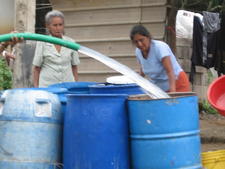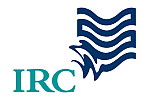Ghana: IRC, WEDC and TREND help train CWSA staff on knowledge management
Updated - Friday 05 December 2008
Knowledge management and sharing experience of IRC and WEDC since 2003 are being used in Ghana, where TREND is tapping this experience in a workshop on knowledge management of selected staff from all districts of the Community Water and Sanitation Agency, which is functioning under the Ministry of Water Resources, Works and Housing. TREND, WEDC and IRC staff helped facilitate this workshop, which attracted 50 participants in early December 2008. The workshop’s aim was to prepare knowledge management procedures and processes for the agency and to assist the CWSA to initiate and facilitate the implementation of KM procedures and processes within the Agency.
“IRC and WEDC are clearly global leading institutions in terms of knowledge management and have between them carried out close to a dozen assignments of similar scope in several developing countries across the globe”, according to the consultant TREND in its inception report for this training, which is funded by DANIDA .
Lessons since 2003
TREND was one of the partners in the WELL Resource Centre Network Programme and IRC’s Resource Centre Development Programme from 2002 to 2007. In September 2003 TREND participated in the three-day hands-on training workshop on Knowledge Management (KM) for Water Management that followed the 6th Water Information Summit (WIS6) in Delft, the Netherlands.
Two articles from 2005 under IRC’s Knowledge Management theme page give a good overview of the process, achievements and challenges of knowledge management and sharing in the Ghana water sector:
- A “From Learn@WELL to KM@TREND” Ghana story from 2005 can be found there.
- Vincent Tays’ paper ‘Knowledge Management case study TREND’ was discussed at the WELL KM workshop at the WEDC conference in Uganda, November 2005, see the PDF.
KM literature selected
TREND has selected relevant literature to help in planning and implementation of this workshop. These included:
- Various documents relating to the CWSA’s on-going restructuring process
- Various publications on KM including a comprehensive article jointly written by Dr Odhiambo and Jaap Pels, who were co-facilitating this workshop
- Case studies of various experiences in KM assignments in various developing countries
- Tested tools for Training Needs Assessment and data gathering from the workshop target group
- Various documents produced in previous efforts to develop Knowledge Management in Ghana including a detailed concept paper developed by TREND in 2006.
Relevant KM tools used
TREND helped with the collection of data for assessment of training needs and planning of the workshop activities involving three tools:
- Personal Knowledge Management Mapping;
- Organisational Knowledge Management Profiling; and
- The Knowledge Management Scan.
The Personal KM Map
The personal KM map is a map of one’s own information behaviour (skills, experience and attitudes). The map addresses KM at the personal scale. The aim of personal mapping is to get people to think about their information behaviour in a systematic way and to take steps to modify it where necessary. Data to construct the map are collected through a questionnaire. TREND has modified a widely used format of the Personal KM map and has produced a customized version for use in the CWSA. The personal KM is addressed to core staff of CWSA in the Regions and the Head office.
Constructing an Organisational KM profile
A second component of data collection is designed to address KM at the organisational scale. It will involve the construction of an organisational profile. This final profile would demonstrate the degree to which the organisation’s KM initiative (if one exists) is understood. TREND has prepared a customised questionnaire to enable the collection of data for the construction of the organisational KM profile. CWSA personnel participating in the KM training and as many other staff of CWSA at the Regions as well as core staff within the Head Office filled in the questionnaire. The feedback from the questionnaire was analysed, synthesized and used as a basis for planning activities during the workshop.
The Knowledge Management Scan
The purpose of a KM scan is to provide a baseline assessment of staff perceptions with regard to the position of KM in the organisation. The scan is based on the model called the Knowledge Value Chain developed by Weggeman (2000). It consists of four main knowledge processes namely: 1) Creation (what knowledge is needed, what is available, and what knowledge needs to be developed), 2) Sharing, 3) Application and 4) Evaluation.
Generally speaking knowledge management is about organising these knowledge processes in such a way that they contribute directly to the competitive edge of an organisation. The lifecycle is fed by organisational goals flowing from the organisation’s mission and vision. The KM Scan was channelled through the CWSA’s Co-ordinator for this assignment to staff in the Head office and the regions. Efforts were made to invvolve core staff of CWSA (and certainly all the staff members participating in the workshop) to complete the KM scan, as this leads to results that are more representative.


